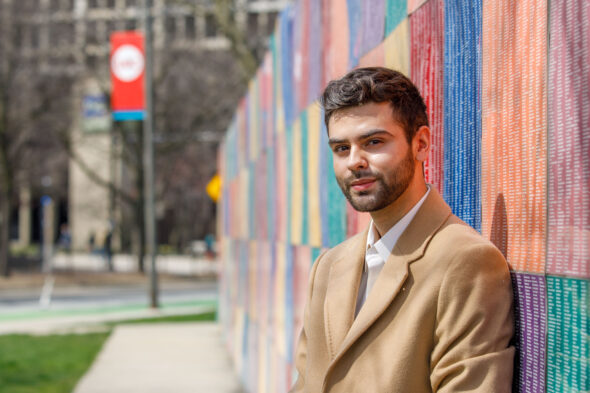Future physician-scientist named Goldwater scholar
Keshav Gandhi doesn’t just want to be a physician. He also aspires to lead a team focused on applying computational technologies in a clinical setting to improve cancer prevention, diagnosis and treatment.
In preparation for his career, the University of Illinois Chicago sophomore works with machine learning models in the fields of bioinformatics and computational biology. He has been involved in numerous interdisciplinary research projects that use computational skills and methods to better understand how cancer grows in the human body.
As a member of UIC’s Honors College and the Guaranteed Professional Program Admissions Medical Scholars Program, Gandhi is pursuing biological sciences and statistics degrees in the College of Liberal Arts and Sciences and a minor in computer science through the College of Engineering.
“It’s an interesting place to be — especially at a point where artificial intelligence and computational genomics are burgeoning fields with applications in oncology,” said Gandhi, from Champaign, Illinois. “I wanted to be part of a field that could apply technology to medicine. And I feel like research is the avenue that has helped me gain that experience.”
For his academic achievements in research, Gandhi recently was awarded the Goldwater Scholarship, which is the most prestigious award in the United States for undergraduate researchers in STEM fields. The highly competitive $7,500 merit scholarship can be used to cover tuition, books or related fees during the 2023-24 and 2024-25 academic years.
From an estimated initial pool of over 5,000 college sophomores and juniors, Gandhi is one of 413 Goldwater Scholars chosen this year from more than 1,200 natural science, engineering and mathematics students nominated by the institutional representatives of 427 colleges and universities nationwide.
Since graduating in 2021 from University High in Urbana, he has worked in the Genomics Group at the National Center for Supercomputing Applications and has been involved with two summer research programs through the El-Kebir lab in the department of computer science at the University of Illinois Urbana-Champaign.
His undergraduate research has focused on areas of major public health interest and earned support from a College of Liberal Arts and Science Undergraduate Research Initiative Award.
During his first semester at UIC, Gandhi approached Alexander “Sasha” Gutfraind, UIC adjunct research assistant professor of epidemiology and biostatistics, about doing a volunteer research project in computational modeling of COVID-19. After joining Gutfraind’s team based in the UIC School of Public Health’s Policy Practice and Prevention Research Center, he has been working on a CDC-funded project on computational modeling of vaccine hesitancy.
Keshav earned the respect of many senior faculty members and postdocs on the research team and will be the lead author of a paper that will likely serve as the foundation for the team’s next grant application, according to Gutfraind.
“In my more than 10 years at UIC, I have never met an undergraduate with such strong preparation and so much initiative,” Gutfraind said. “From day one in my lab, he had proficiency in Python programming, machine learning and statistical methods, and clear ideas of how they could be applied to our datasets. Since joining, he has also mastered methods in GIS modeling, meta-analysis and others, and taught me new techniques.”
Gandhi expressed gratitude for the mentorship and support he has received across UIC, the GPPA Medical Scholars Program and the labs where he has worked.
“It’s a testament to how much they’ve all invested in me,” he said of the Goldwater Scholarship.
Service and advocacy are hallmarks of Gandhi’s campus and community involvement. He founded Autoimmune Action & Advocacy, a student group that conducts outreach, education and advocacy work related to autoimmune diseases in the Greater Chicago area. He does similar work as part of Colleges Against Cancer, where he is education chair and president-elect. Frequent volunteering has also led to an ambassador role with the nonprofit Be The Match.
His outstanding contributions to UIC through campus and community service were recognized during a recent ceremony where he was inducted into the Activities Honorary Society and received the Chancellor’s Student Service Award, the Eugertha Bates Memorial Award, the Jane Addams Distinguished Service Award and the President’s Volunteer Service Award.
He will spend 10 weeks in Germany this summer through an internship from the German Academic Exchange Service, also known as Deutscher Akademischer Austausch Dienst, a German government-funded initiative that brings students from North America, Great Britain and Ireland to Germany for research in STEM fields. As part of the DAAD’s Research Internships in Science and Engineering program, he’ll be based at the University of Göttingen, where he’ll look at applications of AI to analyze biosignaling data.
Gandhi credits his successful pursuit of the Goldwater Scholarship and DAAD RISE internship to the advice and assistance he received from UIC’s Office of Undergraduate Research and External Fellowships through the application process.
“It was a great pleasure to work with Keshav through the Goldwater application process and help him put together very strong applications for both Goldwater and RISE,” said Kim Germain, director of Undergraduate Research and External Fellowships and the designated campus representative for the Goldwater Scholarship. “His future as a physician-scientist is very bright indeed.”

